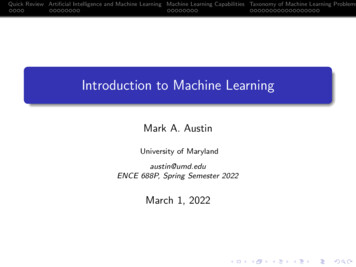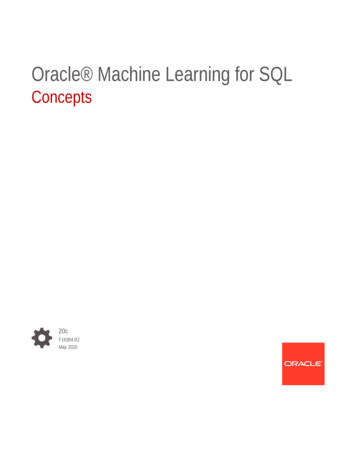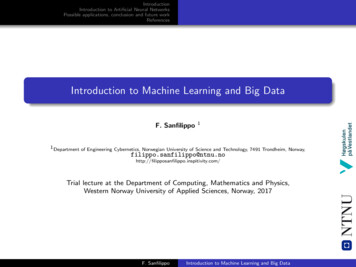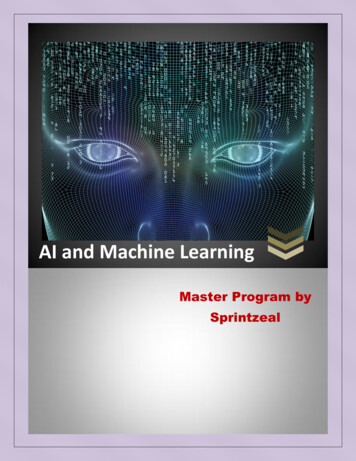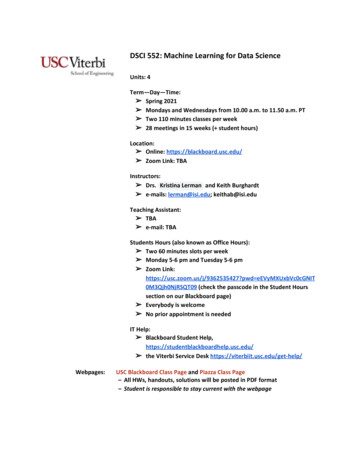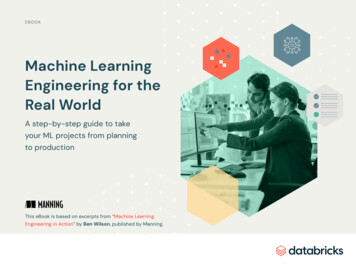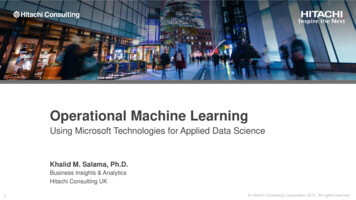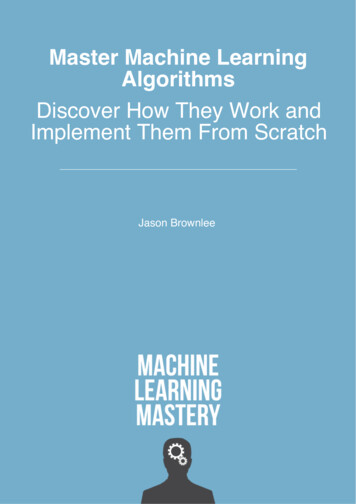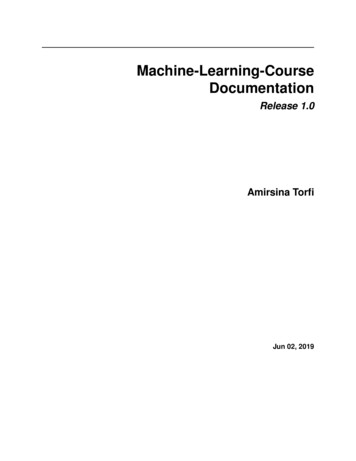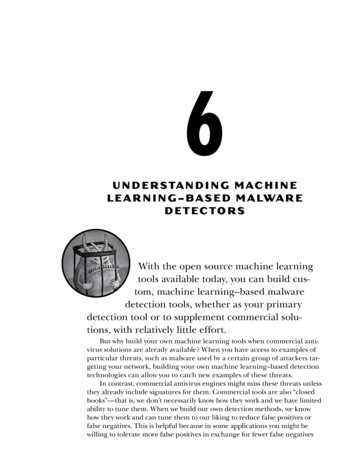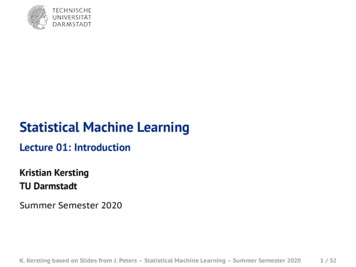
Transcription
Introduction to Machine LearningClass code[Please delete all instructions and square brackets, even if you do not fill anything into a field]Instructor Details[Click here and type name][Click here and type e-mail address][Click here and type phone number (optional)][Click here and type mobile number for field trips][Click here and type your office location and time of office hour, if appropriate]Class DetailsIntroduction to Machine Learning[Click here and enter class meeting time]Location to be confirmed.PrerequisitesCalculus, Linear Algebra, Basic Algorithms, (highly recommended: Probability and Statistics)Class DescriptionMachine learning is an exciting and fast-moving field of computer science with many recentconsumer applications (e.g., Microsoft Kinect, Google Translate, Iphone's Siri, digital camera facedetection, Netflix recommendations, Google news) and applications within the sciences and medicine(e.g., predicting protein-protein interactions, species modeling, detecting tumors, personalizedmedicine). This course introduces undergraduate computer science students to the field of machinelearning. Students learn about the theoretical foundations of machine learning and how to applymachine learning to solve new problems. Assuming no prior knowledge in machine learning, the coursefocuses on two major paradigms in machine learning which are supervised and unsupervised learning.In supervised learning, we learn various methods for classification and regression. Dimensionalityreduction and clustering are discussed in the case of unsupervised learningThe course will consist of lectures and lab sessions.DesiredOutcomesThe goal of this course is to familiarize undergraduate computer science students with basic principlesin machine learning and prepare them for solving data-driven problems.AssessmentComponentsHomework (40%) Final Exam (30%) Final Project (30%)Homework: bi-weekly, starting from the second week of the semester. Each homework consists of oneor two questions together with one or less programming assignment.This must include number of pages of written work and time of oral presentations.Failure to submit or fulfil any required course component results in failure of the class.Be as specific as possible about your expectations regarding student workAssessmentExpectationsGrade A: 90
Grade B: 70 Grade C: 60 Grade D: 60Grade F: Failure in any of three assessment componentsGrade conversionA A- B B B- C C C- D D D- Grading PolicyNYU Paris aims to have grading standards and results in all its courses similar to thosethat prevail at Washington Square.AttendancePolicyHere is NYU’s Attendance Policy for students studying away at a Global Academic Center :161514131211109876FélicitationsExcellentTrès bienBienEncourageant/Assez bienMoyen plusMoyenPassableStudy abroad at Global Academic Centers is an academically intensive and immersiveexperience, in which students from a wide range of backgrounds exchange ideas in discussionbased seminars. Learning in such an environment depends on the active participation of allstudents. And since classes typically meet once or twice a week, even a single absence can causea student to miss a significant portion of a course. To ensure the integrity of this academicexperience, class attendance at the centers is mandatory, and unexcused absences willaffect students' semester grades. Students are responsible for making up any work missed dueto absence. Repeated absences in a course may result in failure.Beginning Fall 2014, at all Global Academic Centers, unexcused absences will bepenalized with a two percent deduction from the student’s final course grade 1.1Other guidelines specific to NYUParis include: Attendance to class and all course-related events, even outside of regularlyscheduled course times, is expected and mandatory. Some class outings/makeup classes take place on Fridays Under no circumstances will non-University-related travel constitute anexcused absence from class. DO NOT book travel until you have received andcarefully studied the syllabus of each of your classes. If you are not sick enough to go to the doctor, you are well enough to go to class.Doctor’s notes will be expected for all medical-related absences. No tests, quizzes, or exams will be made up. A missed test, quiz, or exam willNYU’s “Policies and procedures for students studying away at a Global Academic Center”
result in a zero. Questions about this policy should be directed to the AcademicAffairs team, not your professor.Late Submissionof WorkPlagiarism PolicyNo extension is allowed except in an extraordinary situation which must be approved by the lecturer.New York University in Paris, as an academic community, is committed to freeand open inquiry, to creating an intellectual and social environment that promotes this,and to upholding the highest standards of personal and academic integrity.All NYUP students have the responsibility to uphold these stated objectives. As amember of this community, you accept the responsibility for upholding and maintainingthese standards, which include refraining from all forms of plagiarism and cheating asdetailed below.Cases of plagiarism at NYUParis will be brought to the attention of NYUParisacademic administration as well as the implicated student’s home school Dean.PLAGIARISM: a form of fraud, presenting someone else’s work as though it were your own 2 A sequence of words from another writer who you have not quoted and referenced infootnotes 3 A paraphrased passage from another writer’s work that you have not cited. Facts or ideas gathered and reported by someone else 4 Another student’s work that you claim as your own A paper that is purchased or “researched” for money A paper that is downloaded free of charge from the InternetCHEATING Copying from another student’s exam or quiz Giving or receiving unauthorized assistance (crib sheets, internet, etc.) during anexam or quiz Having someone take your exam Accessing an exam or quiz in an unauthorized fashion prior to its administration Collaborating with other students or unauthorized persons on a take home exam Using the same written material for two courses without the express permission ofboth instructors Fabricating or falsifying dataNYU’s Expository Writing Department’s Statement on PlagiarismNYU Statement on Plagiarism4 NYU Statement on Plagiarism23
Required Text(s) Brief Introduction to Machine Learning without Deep Learning by Kyunghyun Cho (available online athttps://github.com/nyu-dl/Intro to ML Lecture Note)SupplementalTexts(s) (notrequired topurchase ascopies are inNYU-L Library)Kevin Murphy. Machine Learning: a Probabilistic Perspective. 2nd edition. 978-0262018029Chris Bishop. Pattern Recognition and Machine Learning. 978-0-387-31073-2Andreas C. Müller & Sarah Guido. Introduction to Machine Learning with Python. 978-1449369415Internet ResearchGuidelines[Click here and enter guidelines on Internet Research, if appropriate]AdditionalRequiredEquipmentStudents are encouraged to bring their own laptops to the lab sessions.Session 1Supervised Learning[Enter date][Click and enter essay deadlines/work due][Click and enter co-curricular activities, etc.]Session 2Perceptron and Logistic Regression[Enter date][Click and enter essay deadlines/work due][Click and enter co-curricular activities, etc.]Session 3Loss Functions and Support Vector Machines[Enter date][Click and enter essay deadlines/work due][Click and enter co-curricular activities, etc.]Session 4Overfitting, Regularization and Model Complexity[Enter date][Click and enter essay deadlines/work due][Click and enter co-curricular activities, etc.]Session 5Multi-Class Classification and Weight Visualization[Enter date][Click and enter essay deadlines/work due]Watch the video lecture The Best Stats You've Ever Seen by Hans Rosling:https://www.ted.com/talks/hans rosling shows the best stats you ve ever seenSession 6Nonlinear Classification: k-Nearest Neighbour Classifier and Radial Basis Function Networks[Enter date][Click and enter essay deadlines/work due]
[Click and enter co-curricular activities, etc.]Session 7Nonlinear Classification: Adaptive Basis Function Network[Enter date][Click and enter essay deadlines/work due][Click and enter co-curricular activities, etc.]Session 8Linear Regression, Recap of Probability and Distributions[Enter date][Click and enter essay deadlines/work due][Click and enter co-curricular activities, etc.]Session 9Bayesian Linear Regression[Enter date][Click and enter essay deadlines/work due][Click and enter co-curricular activities, etc.]Session 10Dimensionality Reduction via Matrix Factorization[Enter date][Click and enter essay deadlines/work due][Click and enter co-curricular activities, etc.]Session 11Principal Component Analysis and Non-Negative Matrix Factorization[Enter date][Click and enter essay deadlines/work due][Click and enter co-curricular activities, etc.]Session 12Nonlinear Principal Component Analysis: Deep Autoencoders[Enter date][Click and enter essay deadlines/work due]Watch the video lecture How we're teaching computers to understand pictures by Fei-Fei Li:https://www.ted.com/talks/fei fei li how we re teaching computers to understand picturesSession 13Metric Multi-Dimensional Scaling (MDS), k-Means Clustering[Enter date][Click and enter essay deadlines/work due]Watch the interview by Geoff Hinton Code that Runs Our Lives :https://www.youtube.com/watch?v XG-dwZMc7NgSession 14k-Means Clustering, Course Recap[Enter date][Click and enter essay deadlines/work due][Click and enter co-curricular activities, etc.]Session 15[Click here and enter info about final exam, submission of project or individual meetings.]
[Enter date]ClassroomEtiquette No eating in class.No cell phones in class.Leaving class to go to the bathroom or yawning in class is considered rude in France.Required CocurricularActivities[Click here and enter information about required activities, whether organised by NYU or not.]Suggested CocurricularActivities[Click here and enter information about suggested activities, societies, lectures, etc.]Your Instructor[please brief text about yourself, possibly positions, publications, research specialism, conferencesetc.]
in machine learning and prepare them for solving data-driven problems. Assessment Components . Homework (40%) Final Exam (30%) Final Project (30%) Homework: bi-weekly, starting from the second week of the semester. Each homework consists of one or two questions together with one or less programming assignment. This must include number of pages of written work and time of oral presentations .

